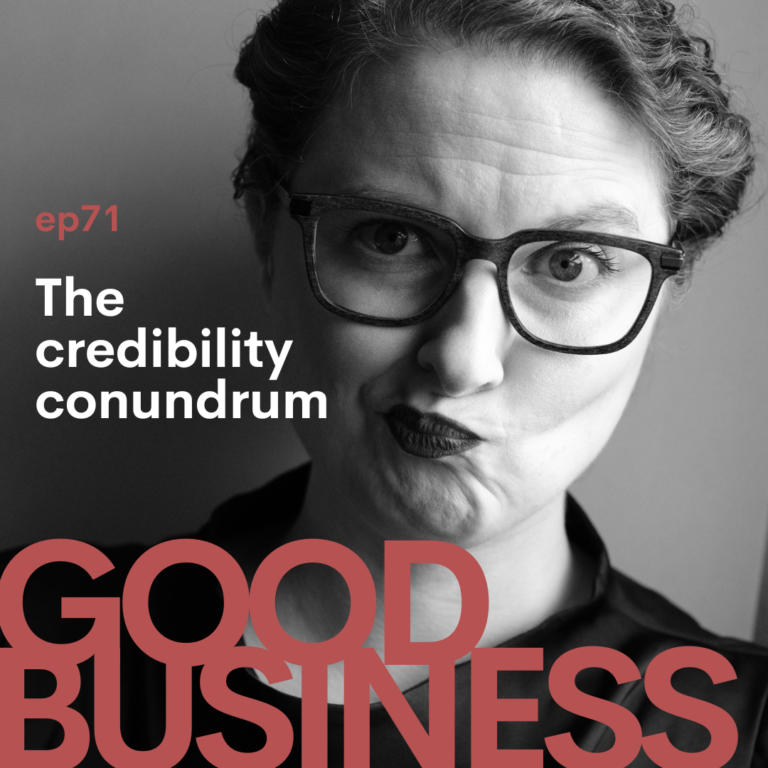In this episode, we address the delicate art of giving feedback. Building on our previous discussion on asking for and receiving feedback, we explore how to give feedback in a way that is empathetic, constructive, and respectful.
Transcript:
Hi there and welcome back, everyone! As promised, today is the second half of our two-parter on getting and giving feedback. In our last episode, we did a deep dive on asking for and successfully receiving feedback. Today, we’re going to cover how to give it in a way that doesn’t completely hurt the person who’s receiving it.
The assumption we’re beginning with today is that you actually want to be good at this and that you want to have the other person’s feelings and best interests at heart. Now, why feelings, you ask? Because we don’t often talk about feelings in business, and that’s something we’re changing. They matter. For too long, we have all, collectively, in a million tiny ways, made other people’s feelings their responsibility. However you feel is your responsibility over there. I carry no responsibility for it, especially in business settings. This allows people to do and say almost anything under the deeply reductive idea that it’s not personal, it’s just business. This mindset has resulted in generations of deeply alienated and lonely people living under the boot heel of those who have convinced themselves that they simply do not have to bother with caring. And that’s where we’re starting today, because I think that’s terrible and has kind of messed up our entire culture in a rather significant way.
So today, we care about feelings, and that’s the backbone of the conversation. When we care about feelings, there are four parts to artfully giving feedback:
1. Check Your Ego:
Offering feedback is not about you. It’s not a promotional opportunity or a moment to show off how smart you are. Know that you may be wrong and be at peace with the person not integrating or taking your feedback. They’re under no obligation to do so.
2. Check and Acknowledge Your Bias:
Your perspective is not their perspective. Your context is not their context. Before offering feedback, recognize your differences in situation, resources, and how important the matter might be to them versus you.
3. Know Your Lane and Stay in It:
Only offer feedback if your expertise, knowledge, and experience are relevant to what’s being asked. If you’re not the right person to speak to the topic at hand, don’t.
4. If It’s Going to Sting, Say So, Then Be Direct:
Keep your voice even, avoid sarcasm and sugarcoating, and prime the recipient for what you’re about to say. Ask for consent before delivering the feedback.
Remember that feelings matter.
If you have to say something that’s going to be hard to hear, keep your voice even, avoid sarcasm, avoid saccharine apologies, try not to sugarcoat, and simply prime them for what you’re about to say.
Ask for consent. Let them know what they’re in for and then give them a second to center themselves so that they don’t feel like they’ve just been knocked onto their heels by a boxer or something, right? You owe them that.
Once they’ve given consent, rip the band-aid off. You don’t hem and haw. You don’t sugarcoat. Nobody is well-served by overly sugarcoating, overly explaining things, or by not saying everything that needs to be said. If you’ve done all those other things, right?
You are a person who’s in a position of expertise. You are the right person to be asking. You know for sure that you checked in with your biases. You understand that they are asking you for something that you are well-qualified to offer them. Nothing good comes from you pulling your punches at that point. That’s not helping them.
So you have to be direct and you have to be willing to go out on that limb and recognize that that’s going to hurt and then be there for them when it does and help them come up with solutions. That’s how you can give feedback without being a total jerk.
That’s it, everyone. As always, you honor me with your attention. Thank you very much for working so hard to run a truly good business and to care about other people’s feelings. It warms my heart. I hope you all have a wonderful week, and I will see you all very soon. Bye, everybody.
More Episodes
GB74: What’s your bread and butter?
Welcome back to Good Business. I’m your host, Illana Burk. Today, we’re talking about the most central parts of your work. The things that always feel true. The things that consistently make money. The things that people always...
GB73: Time to pivot? Oof. I know.
Welcome back to The Good Business Podcast. I’m your host, Illana Burk. Today, we’re talking about the very complicated moment when you realize that it’s time to make a significant change in your work. And these moments are never...
GB72: How to decide where to put your energy
Welcome back to Good Business. I’m your host, Illana Burk. Today, we’re talking about decision-making. Specifically, how do you decide where to put your energy around self-promotion when resources feel limited...
GB71: The credibility conundrum
Welcome back to the Good Business Podcast. I am your host, Illana Burk. And today, we're talking about credibility. What is it? Why do you need it? And how do you establish it in the age of the internet when you can...
GB70: The case for enough
Welcome back to the Good Business Podcast, everybody. I am your host, Illana Burk, and today we are talking about enough. So we begin with one word, and that word is more. That's what we're all supposed to want, right?...
GB69: Why your offerings should reflect what’s best for you
We’re diving into a topic that might just flip the script on how you think about your offers: “Why Your Offerings Should Reflect What’s Best for You Before They Reflect What’s Best for Your Clients.” Sounds counterintuitive. I know. Well, stick around because I’m gonna break it down in a way that’s both practical and super powerful.
First, I’m going to talk about what all this has to do with niching and marketing, then I’ll explain exactly how to do this, and finally I’ll dig into how this improves your leadership positioning.






